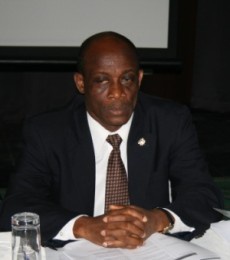
Rising expenditure on the public wage bill is crowding out spending on capital goods and services, Finance Minister Seth Terkper has said. According to him, the huge public wage bill coupled with high interest costs on government borrowing has led to a cut in spending for other social services.
“Programmes such as school feeding, capitation grant as well as payment to road contractors and government service providers have been curtailed to make room for the wage bill,” the Finance Minister said on Wednesday.
As at August 2013, an amount of GH¢463.2million was spent on goods and services, against a budget estimate of GH¢926.3million for the period, while capital expenditure stood at GH¢2.7billion, against a projected GH¢3.2billion for the same period.
The Finance Minister, who was taking his turn at the Ministry of Information’s Meet-the-Press series, added that although the economy has come under less fiscal pressure from subsidies -- owing to the adjustment of petroleum prices and utilities -- mounting pressure from the wage bill, interest costs and grants are threatening the gains made.
Currently, the wage bill takes a significant chunk of tax revenue, 73.9 percent - a figure the Finance Minister said is worrisome given that it is not reflective of the 10 percent 2013 wage increment for public sector workers.
In April and June, the International Monetary Fund (IMF) urged government to “gain control over the wage bill” and conduct a thorough audit of the public sector pay-roll. Estimates are that there is about half-a-million workers on the pay-roll -- but this number is believed to include a lot of fictitious or “ghost” workers.
Labour is meanwhile expected to up its pay demands due to a rise in the cost of living after electricity tariffs were raised by 78.9 percent and water tariffs by 52 percent from October. Transport prices were also hiked by 20 percent last month.
Mr. Terkper has however indicated to the B&FT that government may not yield to the expected sharp rise in public sector salary demands triggered by the increases in household utility and transport costs.
Government capped salary increases this year at 10 percent, the lowest rise since 2010, in its effort to rein-in the cost of wages. The cap was also intended to help government meet its target of cutting the budget deficit to 9 percent of GDP this year, from a peak of 11.8 percent in 2012.
Mr. Terkper has said government’s target is to cut the cost of the wage bill to 35 percent of tax revenue -- which is consistent with the ceiling set by the West African Monetary Zone (WAMZ), the group of six regional economies, including Ghana, which plan to have a common currency by 2015.